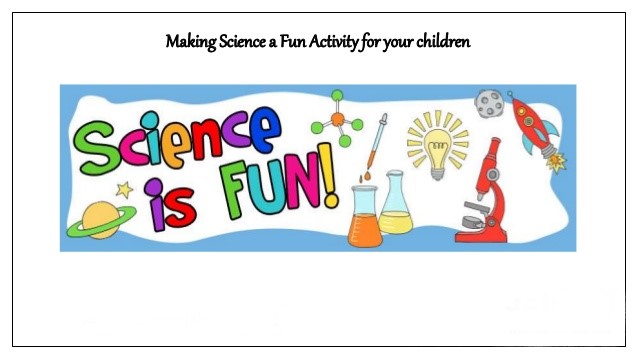Science creates the spark to think of how an atom is formed. It is one subject that can surely gain the kid’s attention towards wanting to know more. It helps kids stop believing something blindly. It is true that science has become much more enjoyable as compared to the days of yore where science was taught to children using chalk and slate. Now, students are more engaged in reading interesting science articles and novels that are related to the strands of science. However, the challenge still remains of how much students can adapt to when science is made fun and not just treated as mere topics in order to pass the examinations.
Here are some ways that can make science enjoyable for the kids:
Learn with your Children
Science is present everywhere. Everything you touch, feel, or see gives you an opportunity to question yourself ‘why?’, ‘how?’ and ‘where?’. This, in turn, encourages your child to be inquisitive to gain more knowledge. Why is the earth round? Why does time exist? What is the purpose of death? You may not know the answer to these questions but together with your child, you can find a definite answer. One has to digest the fact that the universe around the globe is miraculous and so every scientific question has an answer. One can also use interesting science articles and online learning as well as online education to gain knowledge about science.
Advertise the Joy of Reading
Motivate your kids to read interesting science articles on ancient or current affairs. Having access through the printed information in the journals, magazines, and interesting science articles related to astronomy, cardiology, biomedical-oriented aspects put your kid’s mind to think. Knowledge is power and articles, books are full of it. In order to differentiate between plants and animals, the written word is important. Without a world of words in interesting science articles, science would come to a standstill. Nowadays it’s become much easier as there are online education and online learning portals which can be accessed to any smart device with an internet connection.
Use Technology
Kids love electronics, so try incorporating it into the teaching strategy. Instead of standing in front of the classroom and teaching kids important concepts from interesting science articles or textbooks, get themselves engaged in smartboard online learning. This makes the child’s learning comfortable and compelling with the help of online videos rather than limiting them to reading from the book. One such website made available for free science coaching is ‘Scitable’. Furthermore, online education reduces the total tuition cost. It also eradicates the commuting costs. One can also use interesting science articles as a reference to teach kids using technology.
Organize Science Fairs/Events
Science-based events give children the opportunity to be more creative. It helps them grow and grasp many things. It also encourages team-work, group discussions, and presentations. As we know, science fairs are highly competitive and students will find it fascinating to compete with each other on different platforms. Moreover, these events can help every child get recognition and acknowledgment in their academic pursuit. It can also help kids understand how to write their own interesting science articles in the form of a research paper.
Hands-on Experimentation
Science must be brought to life. There is no better way to adapt the knowledge of science than implementing the theories. Kids getting their palms and fingers all dirty is a great way to deal with learning science. This can be done by performing some experiments read from the book, planned out ideas, or even through interesting science articles. There are some interesting science articles that mention certain experiments to be tried at home or in the vicinity. For instance, performing vermicompost, burning of the paper with sunlight using a magnifying glass, plants responding to stimuli, etc. Online education and online learning sites also provide practical kits that are delivered after signing up for respective sites and courses.
Talk to Experts
Experts are often passionate in their field and have a zeal to learn more in their area of interest. You can come across such people from across the globe who know their science. Students can then ask the silliest of questions related to their research work on interesting science topics. Kids must sit around them and give them a chance to explain why they love science. In doing so, these experts can explain what makes interesting science articles compelling.
Create Games
The age of the students does not matter when it comes to playing games. If children need to learn spellings of a scientific term, one can conduct ‘Spelling Bee’ competition. Or, if the child is told to give the names of all wild animals, students can play ‘Atlas’. Games are a way of providing a prescription to happy learning. In the process, a child’s mental setup improves. Their brain becomes more receptive to the content they learn. Online education and online learning websites have implemented games to attract kids with a knack to learn.
Conduct Quizzes
Quizzes are the primary curricular activity. Quizzes offer great practice to know about basic science concepts. It develops the child’s spirit of participation. It also helps them search for facts and enquire about difficult theories. Quizzes also often tend to ask kids to use many of the few interesting science articles to find answers. Or sometimes, kids are asked to get these interesting science articles to class in order to share it with the rest. This makes the class participate in plenty.
In order to make science-oriented concepts relatable and understandable with interesting science topics to young minds, it has to be translated just like how we appreciate it if a foreign language: German is translated into the language we are familiar with. Understanding the scientific method, which is best done by learning science and how we have come about that knowledge, inoculates the child to what otherwise is a constant stream of noise.

